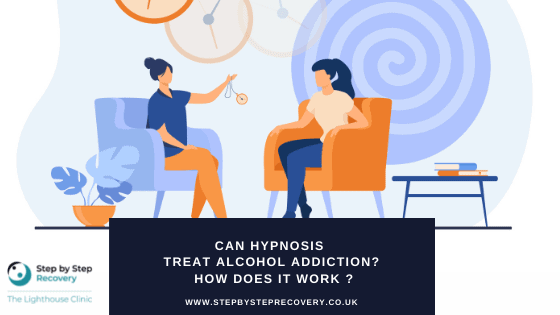Updated February 2023
You have probably heard about hypnosis as a treatment for addiction and other mental health disorders. In this post, we explain the difference between hypnosis and hypnotherapy and what to consider before seeking hypnosis to treat alcohol addiction.
Hypnosis vs Hypnotherapy
The terms hypnotherapy and hypnosis are often used interchangeably, however, they are different processes. Hypnosis describes the trance-like mental state you enter when you are hypnotised. It is achieved by using tools, similar to how smell can trigger a memory.
Hypnotherapy refers to the combination of hypnosis and psychotherapy as a way of accessing the subconscious mind. A hypnotherapist is a qualified psychotherapist trained to use hypnosis for treating alcohol or substance use disorder (SUD). Several scientific studies indicate that medical hypnosis is an effective treatment.
When you are in a hypnotised state, your consciousness becomes far more exposed and open to suggestion, which provides an ideal opportunity to gain psychological insight into your thought processes.
During hypnotherapy, a hypnotherapist will introduce positive suggestions to your subconscious mind. These suggestions become integrated into your subconscious and are designed to help you change the thoughts and behaviours that lead to problematic issues such as alcohol addiction. You remain conscious throughout, speaking with your hypnotherapist and remembering your conversations.
Does Hypnosis for Alcohol Use Disorder (AUD) Work?
Many associate hypnosis with magicians and stage shows, so it is often considered a controversial treatment to help people stop drinking alcohol. But the practice of using hypnosis to reprogram your subconscious mind can be remarkably useful and has several well-researched medical benefits.
Hypnosis for alcohol use disorder is closely linked with techniques used in meditation, as both can relax the conscious mind and allow for increased focus and control over your thoughts and subsequent behaviour. It’s important to remember that hypnotherapy should not be considered a miracle treatment and certainly doesn’t work overnight.
AUD is an extremely complex disorder and in most cases, you will need a medically assisted detox alongside intensive therapy such as dialectical behavioural therapy (DBT ). However, hypnotherapy can be considered a useful tool for aiding overall recovery and maintaining long-term sobriety.
Alcohol Use Disorder vs Alcohol Abuse
AUD is a medical diagnosis of alcohol addiction, characterised by the inability to control alcohol consumption. In contrast, alcohol abuse refers to regular and excessive consumption of alcohol that is still under your control. Without treatment, alcohol abuse will often develop into alcohol use disorder. This is a result of your body becoming tolerant to alcohol, leading you to consume more alcohol during a short period or drink more often.
Over time, you will likely develop withdrawal symptoms when your blood alcohol levels drop below the new tolerance you’ve built over a period of long-term alcohol abuse. Once you stop drinking, your brain must adapt to the alcohol’s absence. Using alcohol to keep this discomfort at bay is referred to as physical dependence. Using alcohol to experience mental effects is known as psychological dependence.
Alcohol use disorder can range from mild to severe. When left untreated, it can have devastating consequences on your mental and physical health. In most cases, if you are diagnosed with alcohol use disorder, you will be physically and psychologically dependent — more often referred to as alcohol addiction. When you are struggling with alcohol addiction, you feel as though you can not function without it.
What Are the Effects of Alcohol Abuse?
Alcohol abuse over a long period, or even after a single binge-drinking session, can have serious implications on your health. Many people are unaware of the impact of short-term heavy drinking — its effects can be just as dangerous as abusing alcohol long-term.
Some of the most common short-term effects of abusing alcohol include:
- Delayed reaction time
- Blurred vision
- Respiratory depression (difficulty breathing)
- Poor judgement
- Slow reflexes
- Lowered inhibitions.
Over time, alcohol abuse can cause more severe damage to your body’s vital organs. This may not be obvious at first, but your health will continue to deteriorate, sometimes causing irreversible damage.
Serious, long-term health conditions caused by alcoholism include:
- Neurobiological (brain) disease
- Liver disease
- Kidney disease
- Increased risk of cancer
- Permanent vision damage
- Osteoporosis (bone loss)
- Diabetes
- Cardiovascular (heart) disease.
Without treatment, these conditions can lead to death. This is why if you are concerned about possible alcohol abuse, you should seek treatment immediately to limit the potential development of these long-term health conditions, if not prevent them entirely.
How Does Hypnosis for Drinking Work?
Hypnosis should only be used to treat alcohol abuse or addiction by a trained psychotherapist (hypnotherapy). A report on hypnotherapy conducted by the British Psychological Society (BPS) stated, “Enough studies have now accumulated to suggest that the inclusion of hypnotic procedures may be beneficial in the management and treatment of a wide range of conditions and problems encountered in the practice of medicine, psychiatry and psychotherapy.”
During a hypnotherapy session, your therapist will sit with you and discuss your issues around alcohol and what you want to achieve from your session. Before using hypnosis, they will explain the process and what to expect and answer any questions you may have. Once you feel comfortable and relaxed, your therapist will ask you to close your eyes or focus on a visual aid, such as a flame or an ornament.
Your therapist will speak to you as they guide you into a state of relaxation called a hypnotic trance. While you’re in this state, they will offer positive suggestions and ask you to visualise certain situations to encourage thought and behavioural changes. Once you have finished these exercises, your therapist will slowly guide you out of the hypnotic state.
When it comes to using hypnosis for alcohol addiction or abuse, the aim is to use suggestions to encourage you to replace problematic thoughts with positive ones. This can subsequently lead to a change in your thought patterns and behaviours.
Benefits of Hypnotherapy for Alcohol Addiction
Hypnotherapy offers an alternative evidence-based treatment for mental health disorders that does not require the use of medication. In addition to being used to treat alcohol addiction, it can also effectively treat:
- Anxiety
- Depression
- Chronic pain
- Migraines
- Sleep disorders
- Eating disorders
- Menopausal symptoms
- Irritable bowel syndrome (IBS).
Risks Associated with Hypnosis
Hypnotherapy is considered a safe treatment for most people, but it may pose risks to those who suffer from other psychiatric disorders, psychosis and psychotic disorders. These risks include:
- Prolonged mental illness
- Seizures
- Dissociative episodes
- Severe anxiety
Additionally, hypnosis comes with the possibility of adverse reactions, such as:
- Headaches
- Drowsiness
- Dizziness
- Creating false memories.
The most successful long-term treatment for alcohol use disorder will involve a comprehensive approach that includes a range of therapies and access to aftercare. Before seeking hypnotherapy, you should speak with your doctor or a licensed mental health or addiction treatment professional.
If you or a loved one is concerned about an alcohol or substance abuse problem, we offer free advice and help. Please complete our online assessment form or call our freephone number (0800 170 1222) to discuss your treatment options with our friendly team.
FAQs
What happens to the brain during hypnosis?
During hypnosis, your brain goes into a trance-like state, where core awareness (consciousness) and activity are reduced.
Does the NHS offer hypnosis for alcoholism?
Hypnotherapy is not usually available on the NHS, however, there are some exceptions. To find out whether you are eligible for hypnotherapy treatment on the NHS, you can speak to your GP or your local integrated care board (ICB).
What are the signs of alcohol use disorder?
Symptoms of AUD can manifest in several ways. The seven most common signs of alcohol addiction are:
- Obsessing over when you can drink alcohol
- Planning events around alcohol
- Mood swings
- Craving alcohol
- Making excuses to drink
- Hiding your drinking from others
- Avoiding friends and family.




